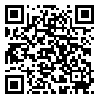جستجو در:
دوره 13، شماره 5 - ( 1401 )
جلد 13 شماره 5 صفحات 452-421 |
برگشت به فهرست نسخه ها
Download citation:
BibTeX | RIS | EndNote | Medlars | ProCite | Reference Manager | RefWorks
Send citation to:



BibTeX | RIS | EndNote | Medlars | ProCite | Reference Manager | RefWorks
Send citation to:
Janani N, Ameri A, Abbasian G. Establishing Interpreter Training Discipline in the Iranian Higher Education. LRR 2022; 13 (5) :421-452
URL: http://lrr.modares.ac.ir/article-14-59288-fa.html
URL: http://lrr.modares.ac.ir/article-14-59288-fa.html
Janani Naser، Ameri Alireza، Abbasian Gholamreza. Establishing Interpreter Training Discipline in the Iranian Higher Education. جستارهای زبانی. 1401; 13 (5) :421-452
1- Ph.D. Candidate, Department of English language, South Tehran Branch, Islamic Azad University, Tehran, Iran
2- Assistant Professor, Department of English language, South Tehran Branch, Islamic Azad University, Tehran, Iran ،a_ameri@azad.ac.ir
3- Associate Professor, Department of English language, South Tehran Branch, Islamic Azad University, Tehran, Iran
2- Assistant Professor, Department of English language, South Tehran Branch, Islamic Azad University, Tehran, Iran ،
3- Associate Professor, Department of English language, South Tehran Branch, Islamic Azad University, Tehran, Iran
چکیده: (1677 مشاهده)
Despite the fact that interpreting has long existed in history and predates translation, the interpreter training as an autonomous discipline is non-existent at the graduate level in Iran. The paramount focus of this study was to probe into the status quo of interpreting courses in the Iranian academia and subsequently delve into the possible expediencies to establishing such a discipline in the higher education. To this end, 15 professional interpreters (9 from Iran and 6 from other countries), 10 interpreter trainers (4 from Iran and 6 from other countries) and 118 English Translation Studies students (32 M.A. and 86 B.A.) who were selected through convenience sampling participated in this study. The students filled out a 20-item researchers-designed Likert-scale interpreting status quo questionnaire and the interpreter trainers and interpreters were invited for a formal semi-structured interview. Findings, analyzed quantitatively by SPSS software version 28 and qualitatively by inductive codification process, revealed the existing situation of the interpreting courses in the Iranian academia in terms of needs analysis, objectives and syllabus, methodology, materials as well as course contents and ensured the significance of establishing interpreter training as an independent discipline in the higher education among all stakeholders, i.e. interpreters, interpreter trainers (teachers) and interpreter trainees (students) for a number of expediencies including non-existence of this discipline in Iran, the need for academization, its multidisciplinary nature, dearth of specialization, addressing stakeholders and researchability, generating pertinent activities, glocal reputation, and employability.
ارسال پیام به نویسنده مسئول
| بازنشر اطلاعات | |
 |
این مقاله تحت شرایط Creative Commons Attribution-NonCommercial 4.0 International License قابل بازنشر است. |









